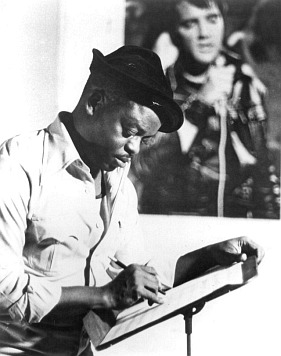
Otis Blackwell was an American songwriter whose work influenced rock and roll. His compositions include "Fever", "Great Balls of Fire" and "Breathless", "Don't Be Cruel", "All Shook Up" and "Return to Sender", and "Handy Man".

"All Shook Up" is a song recorded by Elvis Presley, published by Elvis Presley Music, and composed by Otis Blackwell. The single topped the U.S. Billboard Top 100 on April 13, 1957, staying there for nine weeks. It also topped the Billboard R&B chart for four weeks, becoming Presley's second single to do so, and peaked at No. 1 on the country chart as well. It is certified 2× platinum by the Recording Industry Association of America.

"I'll Be Doggone" is a 1965 song recorded by American soul singer Marvin Gaye and released on the Tamla label. The song talks about how a man tells his woman that he'll be "doggone" about simple things but if she did him wrong that he'd be "long gone". The song was written by Miracles members Smokey Robinson, Pete Moore and Marv Tarplin, initially for The Temptations, who rejected the song.
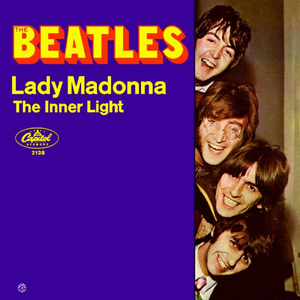
"Lady Madonna" is a song by the English rock band the Beatles, written primarily by Paul McCartney and credited to Lennon–McCartney. In March 1968 it was released as a mono non-album single, backed with "The Inner Light". The song was recorded on 3 and 6 February 1968, before the Beatles left for India, and its boogie-woogie style signalled a more conventional approach to writing and recording for the group following the psychedelic experimentation of the previous two years.
Winfield Scott, also known as Robie Kirk, was an American songwriter and singer. He wrote or co-wrote the hit songs "Tweedle Dee" for LaVern Baker, and he was a co-writer with Otis Blackwell of "Return to Sender" for Elvis Presley. "Return to Sender", written for the Presley film Girls! Girls! Girls!, was a U.K. No.1 single and peaked at No.2 on the U.S. Billboard Hot 100.

"I Can't Stop Loving You" is a popular song written and composed by country singer, songwriter, and musician Don Gibson, who first recorded it on December 3, 1957, for RCA Victor Records. It was released in 1958 as the B-side of "Oh, Lonesome Me", becoming a double-sided country hit single. At the time of Gibson's death in 2003, the song had been recorded by more than 700 artists, most notably by Ray Charles, whose recording reached No. 1 on the Billboard chart.

"All Day and All of the Night" is a song by the English rock band the Kinks from 1964. Released as a single, it reached No. 2 in the UK on the Record Retailer chart and No. 7 on the US Billboard Hot 100 chart in 1965. The song was included on the Kinksize Hits EP in the UK and the Kinks' second American album, Kinks-Size (1965).

"The End of the World" is a pop song written by composer Arthur Kent and lyricist Sylvia Dee, who often worked as a team. They wrote the song for American singer Skeeter Davis, and her recording of it was highly successful in the early 1960s, reaching the top five on four different charts, including No. 2 on the main Billboard Hot 100. It spawned many cover versions.
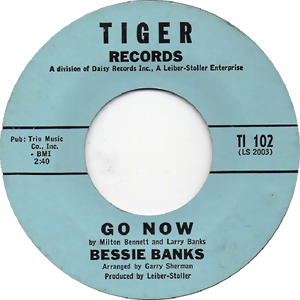
"Go Now" is a song composed by Larry Banks and Milton Bennett and first recorded by Bessie Banks, released as a single in January 1964. The best-known version was recorded by the Moody Blues and released the same year.
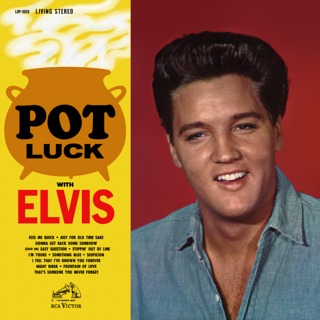
Pot Luck with Elvis is the seventh studio album by American singer and musician Elvis Presley, released on RCA Victor in mono and stereo, LPM/LSP 2523, in May 18, 1962. Recording sessions took place on March 22, 1961, at Radio Recorders in Hollywood, and on June 25 and October 15, 1961, and March 18 and March 19, 1962, at RCA Studio B in Nashville, Tennessee. It peaked at number 4 on the Billboard Top LP's chart.

"Rock-A-Hula Baby ("Twist" Special)" is a 1961 song recorded by Elvis Presley and performed in the 1961 film Blue Hawaii. The song was also released as a single.
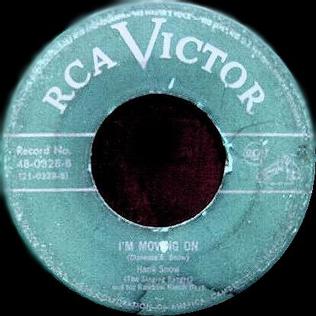
"I'm Moving On" is a 1950 country standard written by Hank Snow. It was a success in the record charts and has been recorded by numerous musicians in a variety of styles.

"(You're the) Devil in Disguise" is a 1963 single by Elvis Presley. It was written by Bill Giant, Bernie Baum and Florence Kaye and was published by Elvis Presley Music in June 1963. The song peaked at No. 3 in the US on the Billboard singles chart on August 10, 1963, and No. 9 on the Billboard Rhythm and Blues singles chart, becoming his last top ten single on those charts. The single was certified "Gold" by the RIAA for sales in excess of 500,000 units in the US. The song also topped Japan's Utamatic record chart in the fall of 1963. In June 1963, when the song was debuted to a British audience on the BBC television show Juke Box Jury, celebrity guest John Lennon voted the song "a miss" stating on the new song that Elvis Presley was "like Bing Crosby now". The song went on to reach No. 1 in the UK for a single week.

"Let's Twist Again" is a song written by Kal Mann and Dave Appell, and released as a single by Chubby Checker. One of the biggest hit singles of 1961, it reached No.8 on the U.S. Billboard pop chart in August of that year and subsequently reached No.2 in the UK in the spring of 1962. The song refers to the Twist dance craze and Checker's 1960 single "The Twist", a two-time U.S. No.1 single.
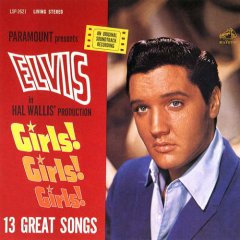
Girls! Girls! Girls! is the fifth soundtrack album by American singer and musician Elvis Presley, released on RCA Victor Records in mono and stereo, LPM/LSP 2426, in November 1962. It accompanied the 1962 film of the same name starring Presley. Recording sessions took place at Radio Recorders in Hollywood on March 26, 27, and 28, and May 23, 1962. It peaked at number three on the Top LPs chart. It was certified Gold on August 13, 1963, by the Recording Industry Association of America.
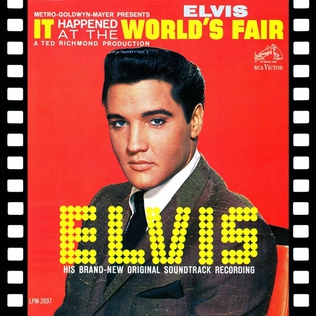
It Happened at the World's Fair is the sixth soundtrack album by American singer and musician Elvis Presley, released by RCA Victor in mono and stereo, LPM/LSP 2697, in April 1963. It is the soundtrack to the 1963 film of the same name starring Presley. Recording sessions took place at Radio Recorders in Hollywood on August 30 and September 22, 1962. It peaked at number four on the Billboard Top Pop Albums chart.

"Little Queenie" is a song written and recorded by Chuck Berry. Released in March 1959 as a double A-side single with "Almost Grown", it was included on Chuck Berry Is on Top (1959), Berry's first compilation album. He performed the song in the movies Go, Johnny Go! (1959) and Hail! Hail! Rock 'n' Roll (1987). One year earlier, Berry had released "Run Rudolph Run", a Christmas song with the same melody.

"Kissin' Cousins" is a song first recorded by Elvis Presley as the title track for the soundtrack of the 1964 motion picture Kissin' Cousins. The movie also featured a completely different song, titled "Kissin' Cousins ", written by Bill Giant, Bernie Baum and Florence Kaye.
"Where Do You Come From" is a song first recorded by Elvis Presley as part of the soundtrack for his 1962 motion picture Girls! Girls! Girls!. It was subsequently rejected for use in the motion picture and did not appear in the film, but was included on its soundtrack album Girls! Girls! Girls!.

"Consolation" is a song written by Swedish keyboardist Benny Andersson, first recorded as the Hep Stars thirteenth single in October 1966. The single largely left the baroque pop style sound which had dominated both their previous singles "Sunny Girl" and "Wedding", but continues the soft rock style of "I Natt Jag Drömde" and also ventures into the territory of psychedelic rock, a genre that would become prevalent the following year.



















